
ក្រុមគ្រួសារជាច្រើននៅសាលាហ៊្វូតព្រីនអន្តរជាតិ កំពុងរង់ចាំពេលវេលាឈប់សម្រាកដ៏សមរម្យមួយ ក្នុងពេលដែលរដូវបុណ្យដំណាច់ឆ្នាំកំពុងខិតជិតមកដល់ (ថ្ងៃចន្ទ ទី២៣ ខែធ្នូ ឆ្នាំ២០២៤ ដល់ថ្ងៃពុធ ទី៨ ខែមករា ឆ្នាំ២០២៥)។ ពេលវេលានេះផ្តល់ឱកាសឱ្យលោកអ្នកបង្កើតទំនាក់ទំនងល្អជាមួយបុត្រធីតា និងការចងចាំដែលមិនអាចបំភ្លេចបាន។ ខាងក្រោមនេះគឺជាគន្លឹះមួយចំនួនដើម្បីជួយលោកអ្នកទាញយកអត្ថប្រយោជន៍ពីរដូវកាលឈប់សម្រាកនេះ៖
តុល្យភាពរវាងការសម្រាកនិងការចូលរួម
ខណៈពេលដែលការសម្រាកមានសារៈសំខាន់ ការរក្សាទម្លាប់ដែលអាចបត់បែនបានអាចជួយរក្សាតុល្យភាពត្រឹមត្រូវ។ អនុញ្ញាតឱ្យបុត្រធីតារបស់លោកអ្នកគេងឱ្យបានយូរជាងមុន ប៉ុន្តែព្យាយាមរក្សាម៉ោងចូលគេងពេលយប់ឱ្យនៅដដែល។ រូមបញ្ចូលការសម្រាកលំហែ ជាមួយនិងសកម្មភាពដែលបញ្ចេញចលនារាងកាយ និងខួរក្បាល ហើយប្រើប្រាស់ប្រតិទិនសាមញ្ញ ឬការរាប់ថយក្រោយដើម្បីបង្កើនភាពរំភើបសម្រាប់ព្រឹត្តិការណ៍នាពេលខាងមុខ ដូចជាការប្រារព្ធកម្មវិធីជាដើម។
ទទួលយកទម្លាប់ថ្មីៗ
រដូវកាលឈប់សម្រាកគឺជាពេលវេលាដ៏ល្អបំផុតក្នុងការណែនាំទម្លាប់ថ្មីៗនៅក្នុងគ្រួសារ។ ស្វែងយល់ពីទីតាំងប្រវត្តិសាស្ត្រក្នុងតំបន់ ឬដើរលេងនៅសួនឧទ្យាននិងតំបន់អភិរក្សធម្មជាតិដែលនៅជិតៗ។ លោកអ្នកក៏អាចចម្អិនអាហារជាមួយគ្នាជាគ្រួសារ សាកល្បងមុខម្ហូបថ្មីៗ ឬធ្វើនំសម្រាប់រដូវកាលឈប់សម្រាកដែលលោកអ្នកចូលចិត្ត។
លើកទឹកចិត្តការសិក្សាតាមរយៈការកម្សាន្តសប្បាយ
ការសិក្សារៀនសូត្រមិនចាំបាច់បញ្ឈប់ក្នុងអំឡុងពេលឈប់សម្រាកនោះទេ! លោកអ្នកអាចឱ្យបុត្រធីតាចូលរួមក្នុងសកម្មភាពដែលមានការអនុវត្តផ្ទាល់ដូចជាការពិសោធវិទ្យាសាស្ត្រ ល្បែងផ្គុំរូប ឬបង្កើតគម្រោងដែលលើកកម្ពស់ភាពច្នៃប្រឌិត និងការត្រិះរិះពិចារណា។ អនុវត្តជំនាញគណិតវិទ្យាពេលចម្អិនអាហារជាមួយគ្នា ឬក្នុងពេលទិញគ្រឿងទេសនៅផ្សារ។ លោកអ្នកអាចពិចារណាក្នុងការធ្វើកិច្ចការ DIY ដូចជាការជួសជុល ឬកែលម្អសម្ភារៈក្នុងផ្ទះ ឬបង្កើតអ្វីមួយដែលចេញពីការស្រមើស្រមៃ។
បណ្តុះភាពច្នៃប្រឌិត និងការស្វែងយល់
ជំរុញការស្រមើស្រមៃរបស់បុត្រធីតាលោកអ្នក ជាមួយនឹងសកម្មភាពដែលលើកកម្ពស់ភាពច្នៃប្រឌិត។ រៀបចំកន្លែងគូរគំនូរជាមួយនឹងសម្ភារៈផ្សេងៗ បង្កើតកន្លែងអានសៀវភៅដ៏មានផាសុកភាពមួយជាមួយនឹងសៀវភៅដែលទាក់ទាញចំណាប់អារម្មណ៍របស់ពួកគេ និងស្វែងយល់ពីចំណង់ចំណូលចិត្តថ្មីៗជាមួយគ្នា មិនថាជាការគូររូប តន្ត្រី ឬថតរូបនោះទេ។ លោកអ្នកអាចស្វែងរកវគ្គសិក្សា ឬមេរៀនលើប្រព័ន្ធអុីនធឺណិតដើម្បីជួយពន្យល់ណែនាំ បុត្រធីតាលោកអ្នកឆ្ពោះទៅកាន់ភាពច្នៃប្រឌិតដែលពួកគេស្វែងរក។
ការផ្តល់ត្រឡប់ទៅសហគមន៍វិញ
ប្រើប្រាស់ពេលវេលានេះដើម្បីបង្រៀនបុត្រធីតាលោកអ្នក អំពីតម្លៃនៃភាពសប្បុរស និងការជួយអ្នកដទៃ។ ស្ម័គ្រចិត្តនៅអង្គការសប្បុរសធម៌ក្នុងស្រុក ឬរៀបចំយុទ្ធនាការបរិច្ចាគសម្រាប់អ្នកដែលត្រូវការជំនួយ។ សកម្មភាពសប្បុរសធម៌តូចៗ ដូចជាការជួយអ្នកជិតខាង ឬការធ្វើសកម្មភាពសប្បុរសធម៌ដោយចៃដន្យ អាចមានឥទ្ធិពលយ៉ាងខ្លាំង និងជួយឱ្យបុត្រធីតាលោកអ្នកយល់ពីសារៈសំខាន់នៃការផ្តល់ត្រឡប់ទៅវិញ។
ត្រៀមខ្លួនសម្រាប់ការត្រឡប់ទៅសាលារៀនវិញ
នៅពេលដែលការឈប់សម្រាកខិតជិតមកដល់ទីបញ្ចប់ នេះគឺជាពេលដែលត្រូវចាប់ផ្តើមត្រៀមខ្លួនសម្រាប់ការត្រឡប់មកសាលារៀន។ រំឭកនូវអ្វីដែលបុត្រធីតាលោកអ្នកបានរៀនក្នុងអំឡុងពេលឈប់សម្រាក និងណែនាំវិធីសាស្ត្រសប្បាយៗ ដើម្បីធ្វើឱ្យការត្រឡប់ទៅកាន់ទម្លាប់សិក្សារបស់ពួកគេវិញមានភាពងាយស្រួល។ រៀបចំសម្ភារៈសិក្សា បង្កើតតារាងត្រួតពិនិត្យការត្រឡប់ទៅសាលារៀនវិញ និងពិភាក្សាអំពីសកម្មភាពរំភើបៗដែលពួកគេនឹងរង់ចាំនៅក្នុងវគ្គសិក្សាខាងមុខ។
រដូវកាលឈប់សម្រាកនេះគឺជាឱកាសសម្រាប់ការសម្រាកលំហែ ការសិក្សារៀនសូត្រ ការផ្សងព្រេង និងការឆ្លុះបញ្ចាំង។ រក្សាតុល្យភាពរវាងពេលទំនេរ ជាមួយនឹងសកម្មភាពបំពេញបន្ថែមដែលរស់រវើក ដើម្បីពង្រឹងទំនាក់ទំនងគ្រួសារ គាំទ្រការរីកចម្រើនរបស់បុត្រធីតាលោកអ្នក និងបង្កើតការចងចាំដ៏មានតម្លៃ។ សូមរីករាយជាមួយនឹងថ្ងៃឈប់សម្រាក!
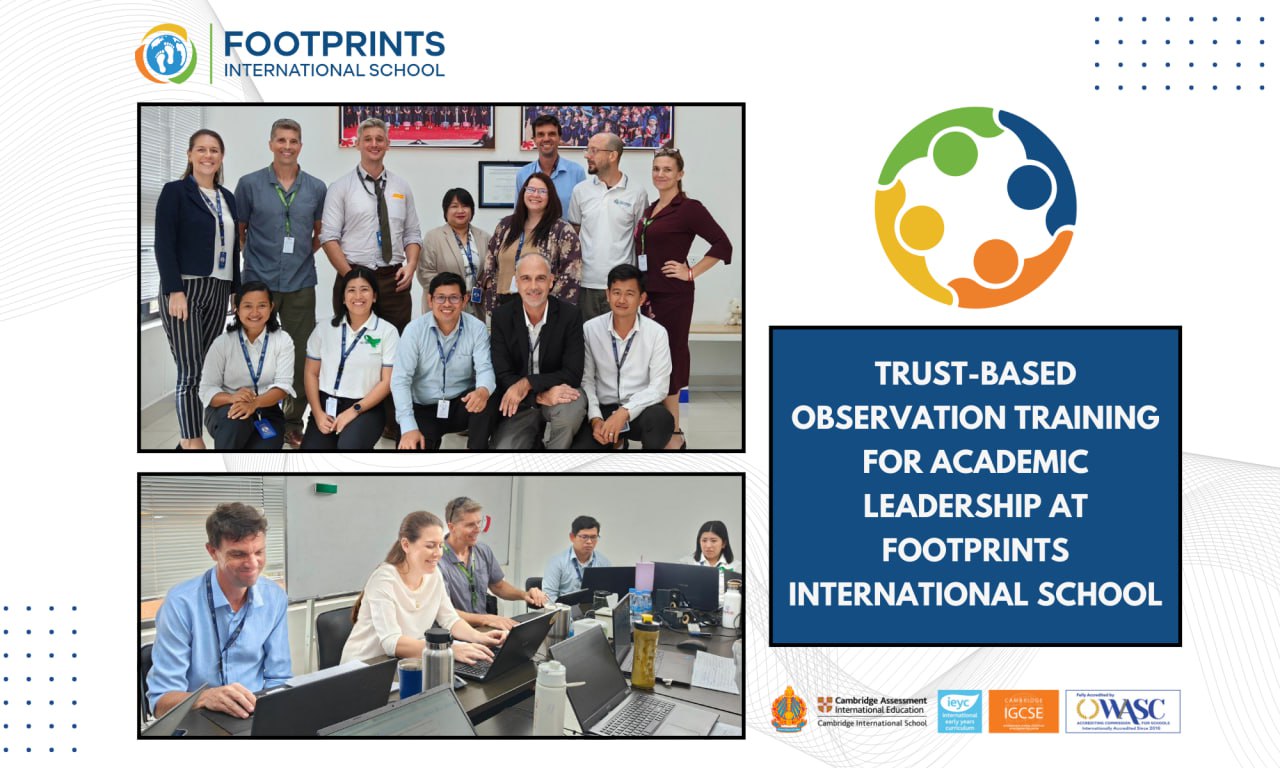
(English) From Monday, October 7th to Friday, October 11th, our Academic Leadership Team took part in an intensive professional development programme focused on Trust-Based Observation (TBO) practices. Led by renowned experts Craig Randall, author of the acclaimed book on TBO, and Kate O’Connell, MA.Ed, a respected facilitator of professional growth, this training was a significant step in enhancing leadership practices at our school.
TBO is an approach designed to build trust between academic leaders and faculty members during classroom observations. Unlike traditional observation methods that can feel evaluative and detached, TBO emphasises frequent, informal visits and supportive, reflective conversations. The goal is to create a nurturing environment where teachers feel acknowledged for their strengths and supported in areas for growth. This method fosters open dialogue, increases trust, and ultimately leads to improved teaching and learning outcomes.
During the training, our Principals, Vice-Principals, Instructional Coach and Programme Coordinators engaged in hands-on sessions that included observing real classroom environments and participating in reflective feedback discussions. This training will equip our leadership team to implement TBO practices effectively, which is crucial for creating a culture of continuous improvement within the school. It is important to note that while this training was for our leadership team, its benefits will eventually ripple throughout the entire academic community.
As we move forward, our leadership team is excited to apply these practices in a way that supports our mission of fostering academic excellence while nurturing a positive and collaborative school culture. We believe this training will have long-lasting benefits, strengthening the relationships between our leadership and teaching staff, and ultimately benefiting the students we serve.
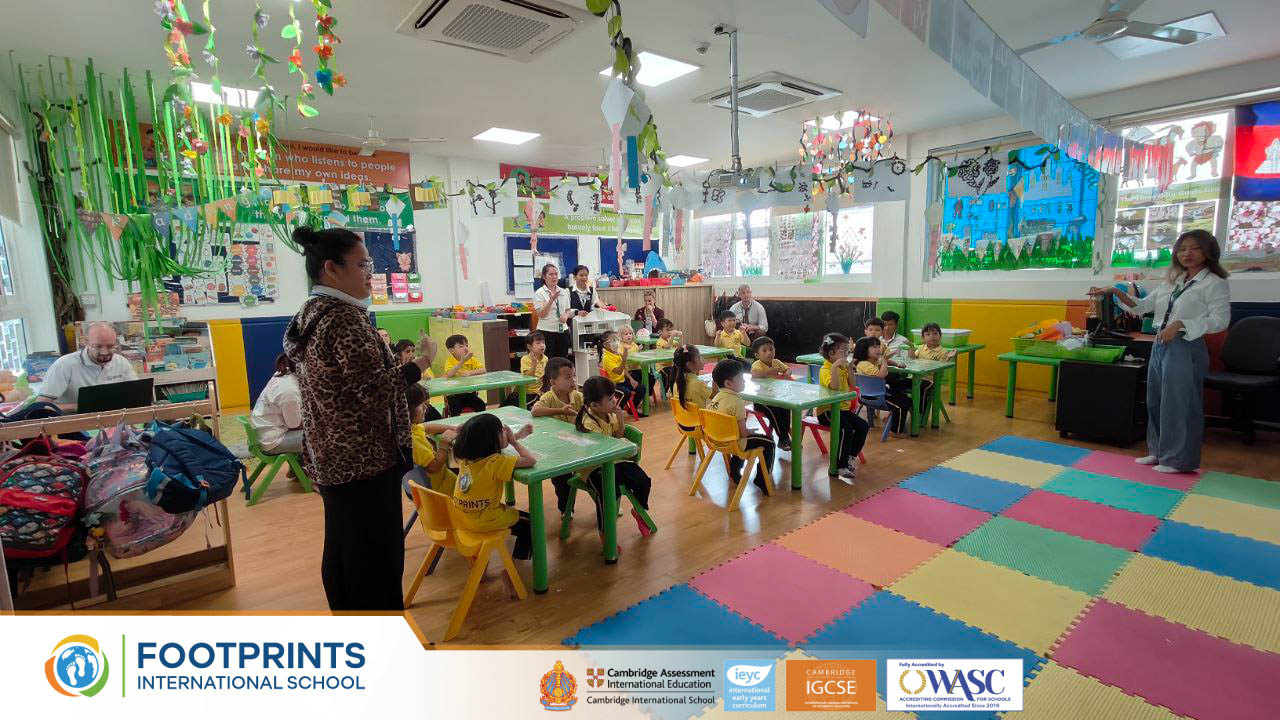
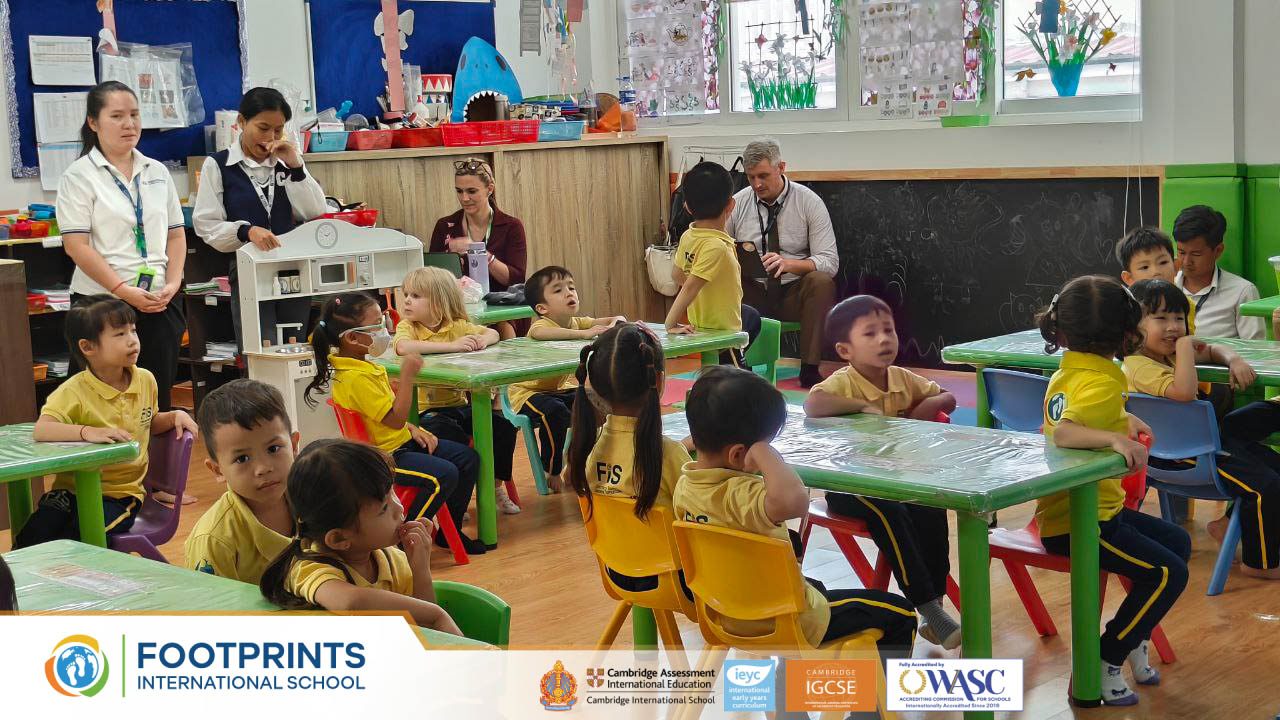
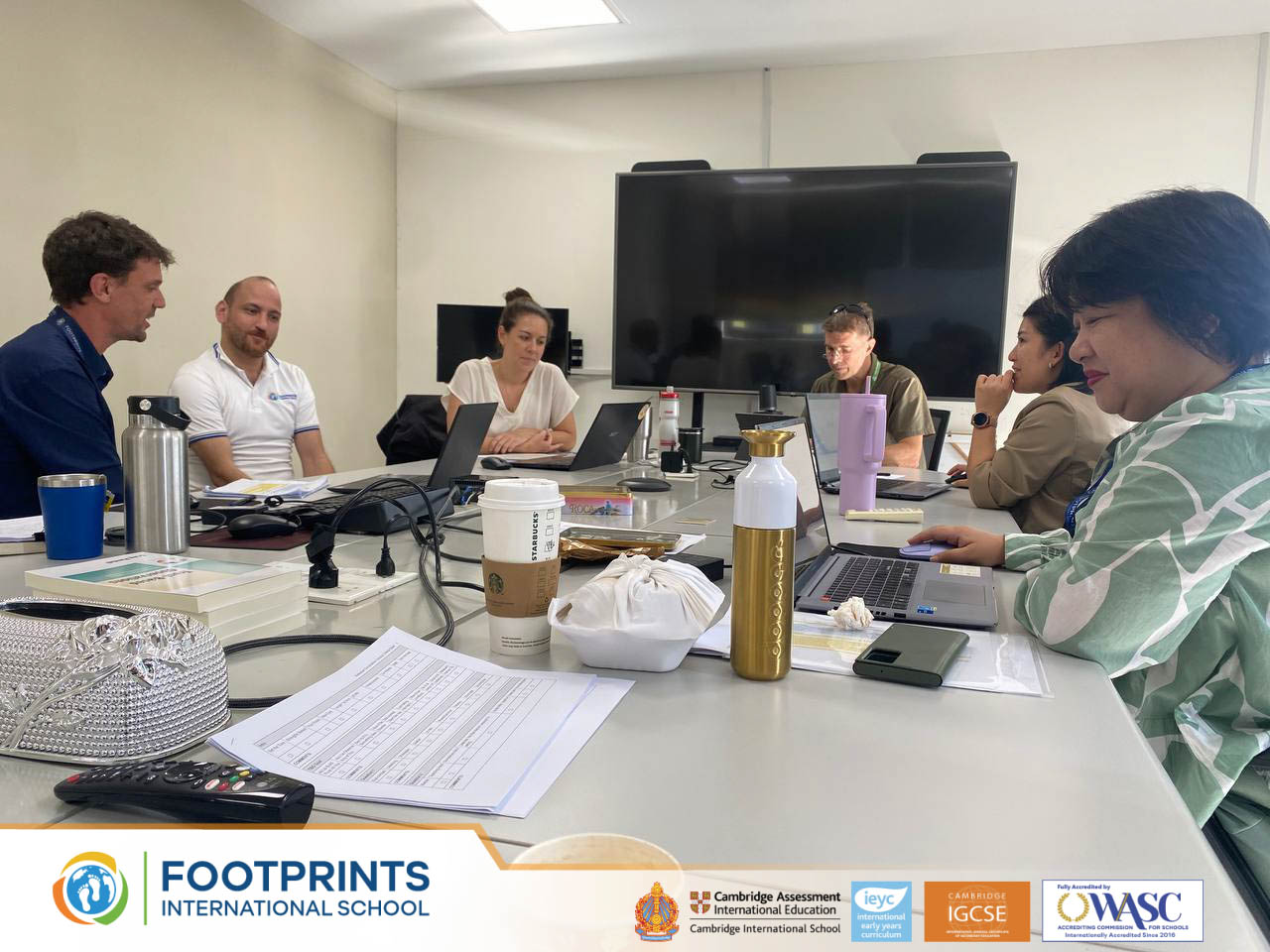
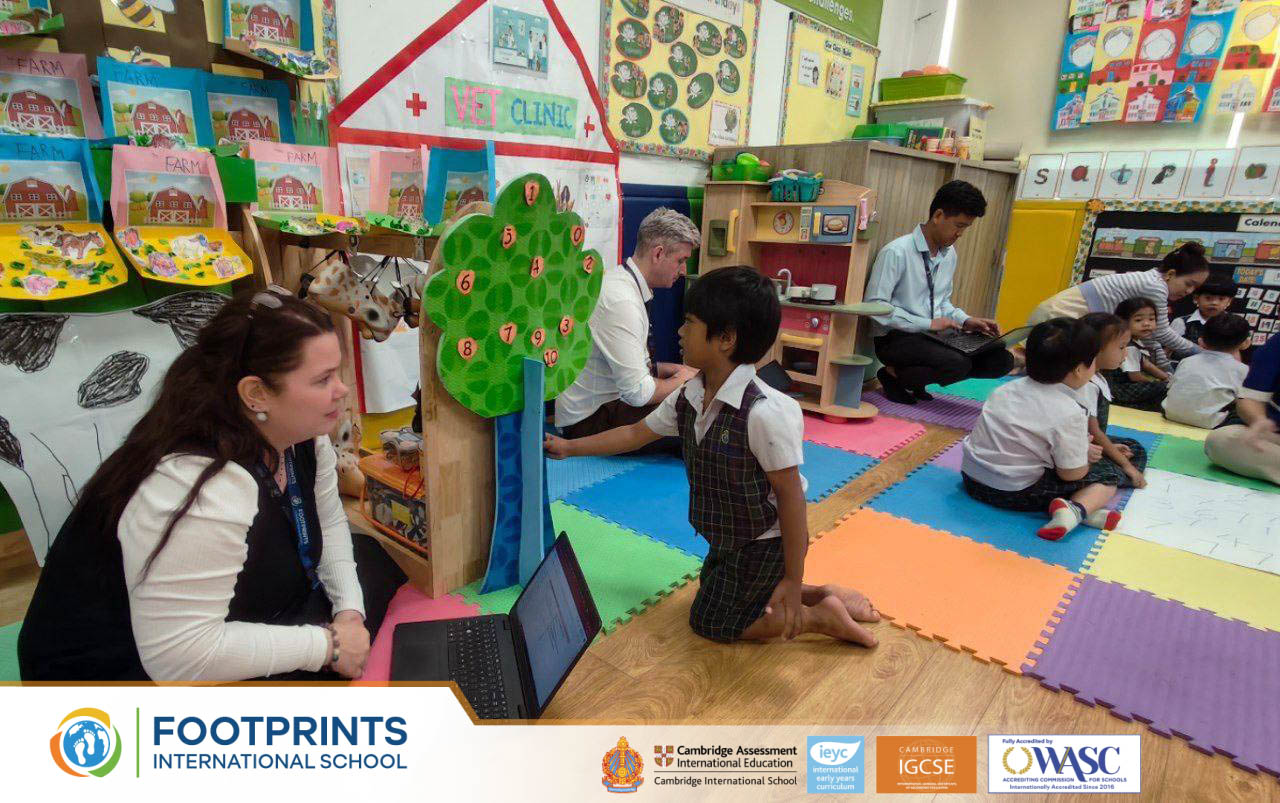
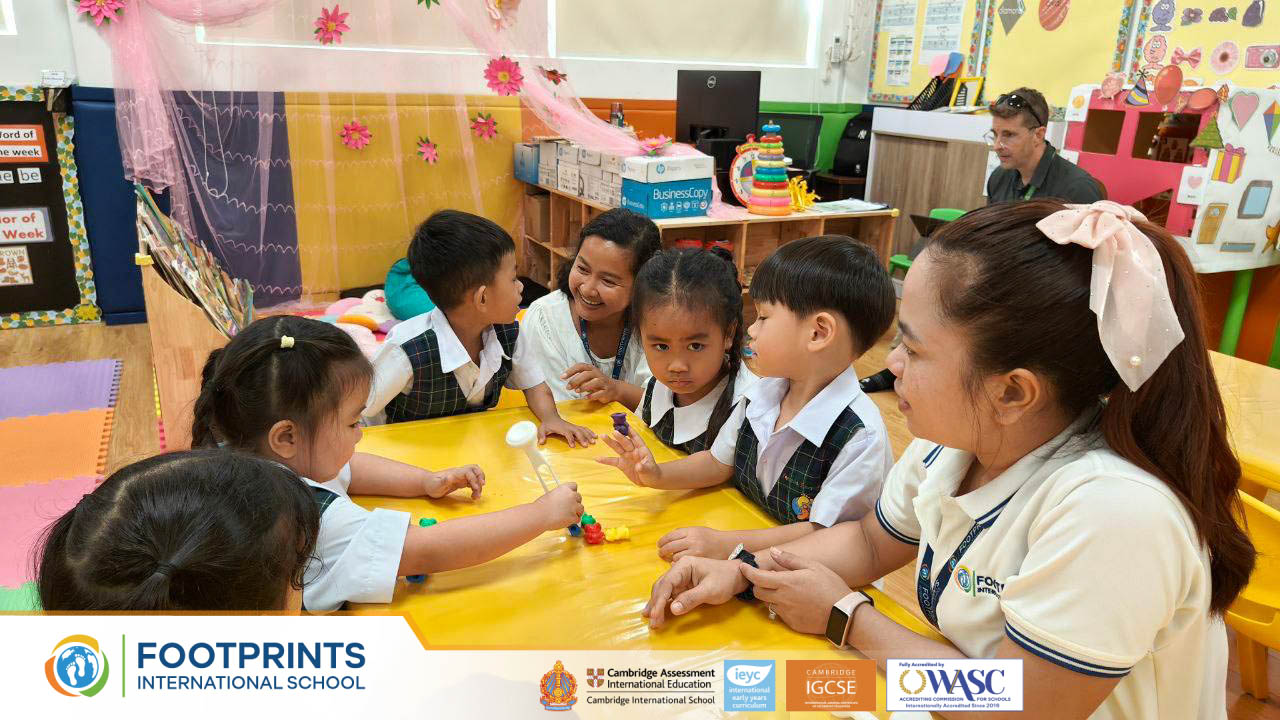
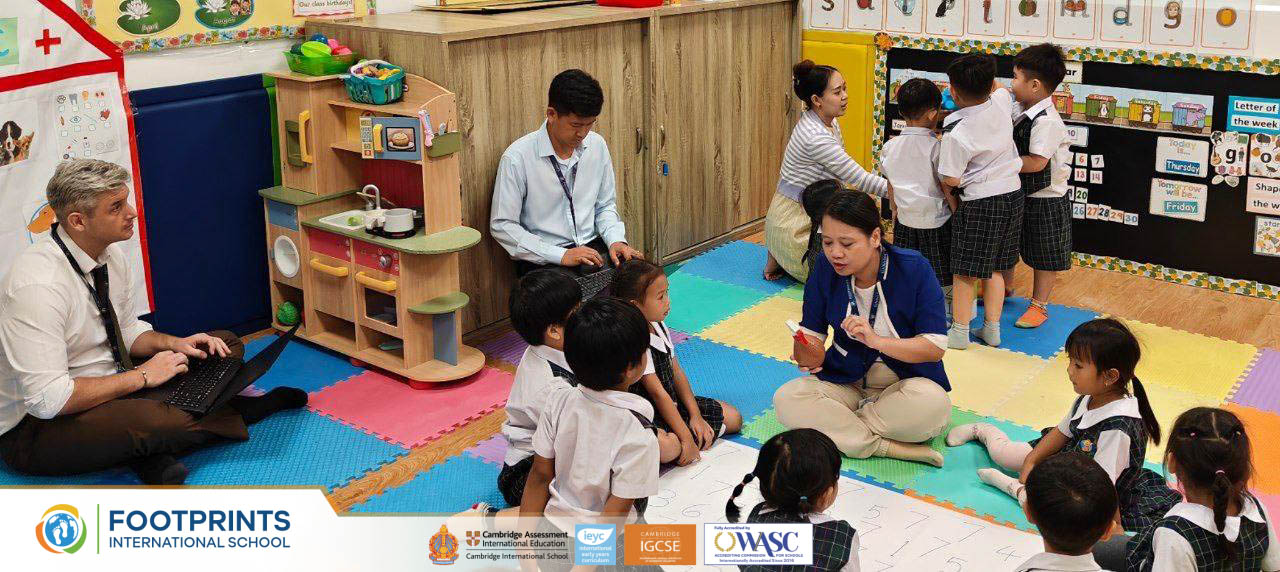
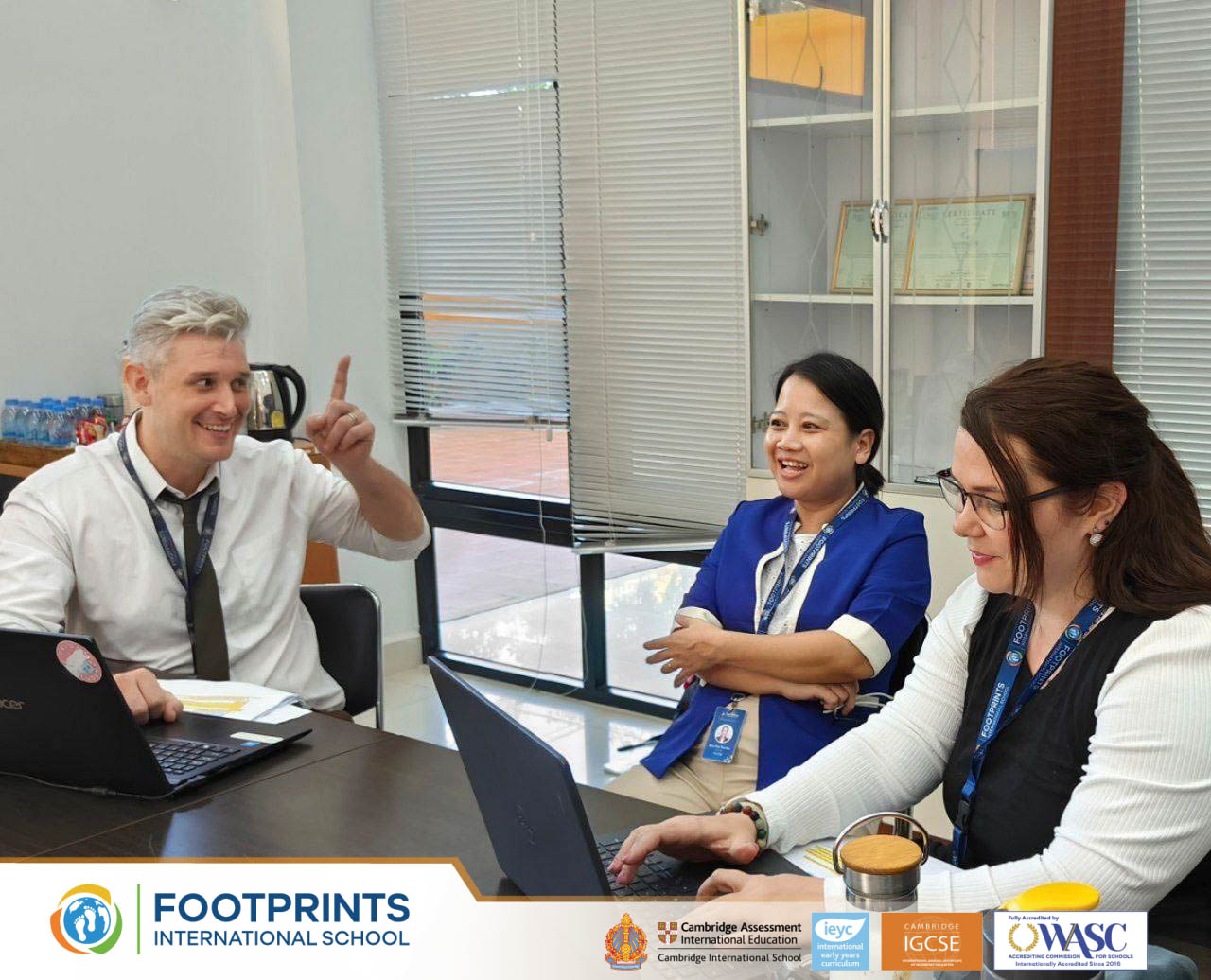
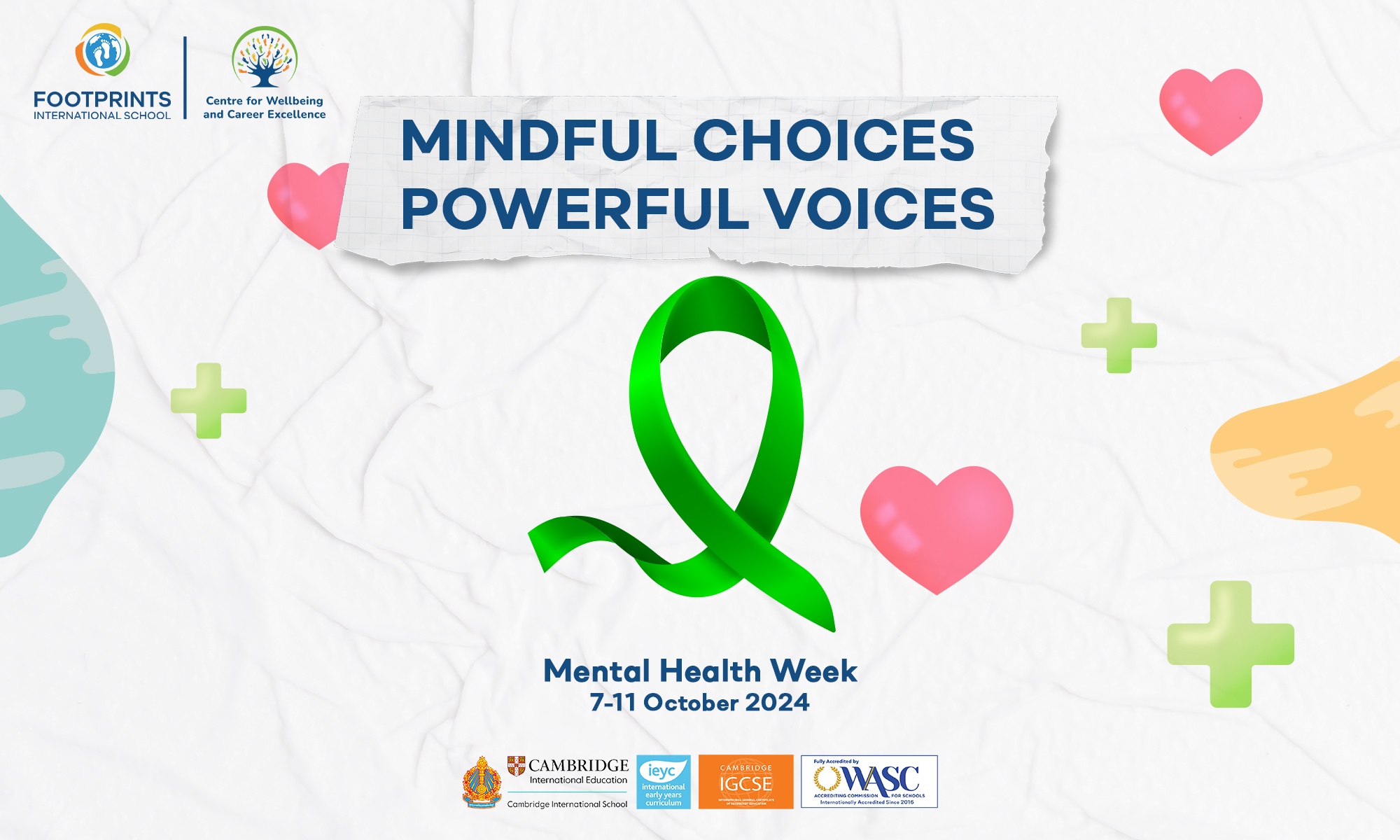
(English) At Footprints International School, we understand the critical role mental health plays in the overall development and success of our students.
From October 7th to 11th, 2024, the Centre for Wellbeing and Career Excellence (CWCE) will lead our Mental Health Awareness Week, focusing on mental wellbeing.
According to the World Health Organization, mental health is more than just the absence of mental illness. It is a state of wellbeing where individuals realise their potential, cope with the stresses of life, work productively, and contribute to their community. Mental health is essential for our collective and individual capacity to function, think, and form meaningful relationships.
At Footprints, we believe that fostering mental health is just as important as academic achievement. Events like Mental Health Awareness Week encourage students, teachers, and parents to actively engage in discussions and activities that promote emotional resilience, social skills, and overall wellbeing. By addressing mental health openly, we create a supportive environment that empowers our students to thrive, both in school and beyond.
Parents play an essential role in nurturing their child’s mental health. Here are a few practical ways you can help:
Together, let’s make mental health a priority!
Resources for Additional Reading:
Khmer:
English:
នៅសាលាហ៊្វូតព្រីនអន្តរជាតិ យើងខ្ញុំយល់ច្បាស់ថាសុខភាពផ្លូវចិត្តដើរតួនាទីយ៉ាងសំខាន់នៅ ក្នុងការអភិវឌ្ឍគ្រប់ជ្រុងជ្រោយ និងភាពជោគជ័យរបស់សិស្សានុសិស្សរបស់យើង។
ចាប់ពីថ្ងៃទី៧ ដល់ថ្ងៃទី១១ ខែតុលា ឆ្នាំ២០២៤ មជ្ឈមណ្ឌលសុខុមាលភាព និងឧត្តមភាពការងារ (CWCE) នឹងរៀបចំដឹកនាំកម្មវិធីសប្តាហ៍នៃចំណេះដឹងអំពីសុខភាពផ្លូវចិត្ត ដែលផ្តោតលើសុខុមាលភាព ផ្លូវចិត្តជាចម្បង។
យោងតាមអង្គការសុខភាពពិភពលោក សុខភាពផ្លូវចិត្តគឺលើសពីការមិនមានជំងឺផ្លូវចិត្ត។ វាគឺជា ស្ថានភាពដែលបុគ្គលគ្រប់រូបយល់ពីសក្តានុពលរបស់ខ្លួនឯង អត់ធន់ជាមួយនឹងភាពតានតឹងនៃជីវិត ធ្វើកិច្ចការងារប្រកបដោយប្រសិទ្ធភាព និងផ្តល់ការចែករំលែកទៅកាន់សហគមន៍របស់ពួកគេ។ សុខភាពផ្លូវចិត្តមានសារៈសំខាន់សម្រាប់សមត្ថភាពបុគ្គល និងជារួមក្នុងការបំពេញកិច្ចការងារ គិត និងបង្កើតទំនាក់ទំនងប្រកបដោយអត្ថន័យ។
នៅសាលាហ៊្វូតព្រីន យើងខ្ញុំជឿជាក់ថាការបណ្តុះឱ្យមានសុខភាពផ្លូវចិត្តគឺពិតជាមានសារៈសំខាន់ដូចទៅ នឹងភាពជោគជ័យក្នុងការសិក្សាដូច្នោះដែរ។ កម្មវិធីសប្តាហ៍នៃចំណេះដឹងអំពីសុខភាពផ្លូវចិត្ត លើកទឹកចិត្តឱ្យសិស្សានុសិស្ស លោកគ្រូអ្នកគ្រូ និងមាតាបិតាសិស្សចូលរួមយ៉ាងសកម្មក្នុងការពិភាក្សា និងក្នុងសកម្មភាពលើកកម្ពស់ភាពធន់លើផ្លូវចិត្ត ជំនាញក្នុងការទាក់ទង និងសុខុមាលភាពទាំងមូល។ ការលើកឡើងអំពីសុខភាពផ្លូវចិត្តដោយបើកចំហ ធ្វើឱ្យយើងបង្កើតបាននូវបរិយាកាសដែលប្រកបដោយការគាំទ្រ ហើយផ្តល់ថាមពលដល់សិស្សានុសិស្សរបស់យើងឱ្យកាន់តែរីកចម្រើនទាំងនៅក្នុងសាលារៀន និងពិភពខាងក្រៅ។
មាតាបិតាដើរតួនាទីយ៉ាងសំខាន់ក្នុងការបណ្តុះសុខភាពផ្លូវចិត្តរបស់បុត្រធីតារបស់ខ្លួន។ ខាងក្រោមនេះគឺជាវិធីសាស្រ្តមួយចំនួនដែលលោកអ្នកអាចធ្វើបាន៖
១. ចំណាយពេលក្នុងការស្តាប់៖ បង្កើតទម្លាប់ក្នុងការនិយាយជាមួយបុត្រធីតាលោកអ្នកជាប្រចាំ សាកសួរពីអារម្មណ៍របស់ពួកគេ និងលើកទឹកចិត្តឱ្យពួកគេនិយាយអំពីអ្វីដែលពួកគេជួបប្រទះ។ បង្កើតបរិយាកាសដែលបើកចំហ និងពោរពេញដោយទំនុកចិត្ត អាចជួយដល់ពួកគេឱ្យមានផាសុកភាព ក្នុងការបង្ហាញនូវអារម្មណ៍របស់ពួកគេ ដែលវាពិតជាមានសារៈសំខាន់សម្រាប់សុខភាពផ្លូវចិត្ត។
២. ជួយគាំទ្រដល់ពួកគេពេលដែលជួបការលំបាក៖ យកចិត្តទុកដាក់លើការផ្លាស់ប្តូរអាកប្បកិរិយា ឬអារម្មណ៍របស់បុត្រធីតាលោកអ្នក ហើយផ្តល់ការណែនាំនៅពេលដែលពួកគេជួបការលំបាក ដូចជា ភាពតានតឹងនៅសាលារៀន ឬបញ្ហាទំនាក់ទំនងផ្សេងៗ។ ធ្វើជាបុគ្គលដែលផ្តល់ការគាំទ្រ ដែលពួកគេអាចពឹកពាក់បានក្នុងការឆ្លងកាត់បញ្ហាទាំងនេះ។
៣. លើកទឹកចិត្តដល់ចំណង់ចំណូលចិត្តរបស់ពួកគេ៖ ការចូលរួមក្នុងសកម្មភាពដូចជា កីឡា សិល្បៈ ឬចំណង់ចំណូលចិត្តផ្សេងៗ អាចផ្តល់ឱ្យនូវអារម្មណ៍ស្រស់ស្រាយ កាត់បន្ថយភាពតានតឹង និងបង្កើនទំនុកចិត្តលើខ្លួនឯង។ លើកទឹកចិត្តបុត្រធីតាលោកអ្នកឱ្យធ្វើតាមអ្វីដែលធ្វើឱ្យពួកគេរំភើប ដោយការធ្វើបែបនេះអាចជួយជំរុញសុខភាពផ្លូវចិត្តរបស់ពួកគេកាន់តែកើនឡើង។
៤. បង្កើតនូវទម្លាប់វិជ្ជមាន៖ ទម្លាប់ជាប្រចាំ រួមមានការចូលគេងទៀងទាត់ពេលវេលា ការញ៉ាំអាហារដែលមានតុល្យភាព និងការធ្វើលំហាត់ប្រាណ ជួយដល់សុខភាពផ្លូវចិត្ត និងរូបរាងកាយ។ ជួយឱ្យបុត្រធីតារបស់លោកអ្នករក្សាបាននូវសុខុមាលភាព ដោយការលើកទឹកចិត្តឱ្យមានទម្លាប់ល្អក្នុងការរស់នៅ។
៥. ធ្វើជាគំរូដោយការបង្ហាញឥរិយាបថវិជ្ជមាន៖ កុមាររៀនតាមរយៈការសង្កេត ហើយជារឿយៗ ពួកគេនឹងធ្វើត្រាប់តាមឥរិយាបថរបស់ឪពុកម្តាយ។ បង្ហាញពួកគេពីវិធីសាស្ត្រវិជ្ជមានក្នុងការគ្រប់គ្រង ភាពតានតឹង សម្រួលអារម្មណ៍ និងរក្សាតុល្យភាពនៃទំនួលខុសត្រូវ។
៦. ផ្តល់កាលវិភាគ និងព្រំដែន៖ វិន័យដែលច្បាស់លាស់ និងការរំពឹងទុកដែលមិនងាករេនឹងផ្តល់នូវអារម្មណ៍សុវត្ថិភាពដល់កុមារ និងធ្វើឱ្យពួកគេកាន់តែយល់។ កាលវិភាគក៏ជួយពួកគេក្នុងការធ្វើកិច្ចការ និងទំនួលខុសត្រូវប្រចាំថ្ងៃដោយមានប្រសិទ្ធភាព។
៧. លើកទឹកចិត្តឱ្យមានទំនាក់ទំនងនៅក្នុងសង្គម៖ មិត្តភាពគឺជាគន្លឹះក្នុងការអភិវឌ្ឍនូវអារម្មណ៍។ ជួយដល់បុត្រធីតាលោកអ្នកបង្កើត និងរក្សាទំនាក់ទំនងជាមួយមិត្តភក្តិ។
៨. ស្វែងរកជំនួយពីអ្នកជំនាញនៅពេលដែលចាំបាច់៖ ប្រសិនបើលោកអ្នកសង្កេតឃើញពីការផ្លាស់ប្តូរ ដែលគួរឱ្យកត់សម្គាល់ណាមួយលើអាកប្បកិរិយា ឬស្ថានភាពផ្លូវចិត្តរបស់បុត្រធីតាលោកអ្នក សូមពិចារណាក្នុងការស្វែងរកជំនួយ។ មាតាបិតា និងសិស្សានុសិស្សនៃសាលាហ៊្វូតព្រីនអន្តរជាតិអាច ទាក់ទងមកកាន់មជ្ឈមណ្ឌលសុខុមាលភាព និងឧត្តមភាពការងារ (CWCE) ឬពិគ្រោះជាមួយវេជ្ជបណ្ឌិតជំនាញទៅតាមជម្រើសរបស់ខ្លួន។
យើងរួមគ្នាចាត់ទុកសុខភាពផ្លូវចិត្តជាអាទិភាពសំខាន់ជាមួយគ្នា!
ឯកសារសម្រាប់ការអានបន្ថែម៖
ជាភាសាខ្មែរ៖
ជាភាសារអង់គ្លេស៖
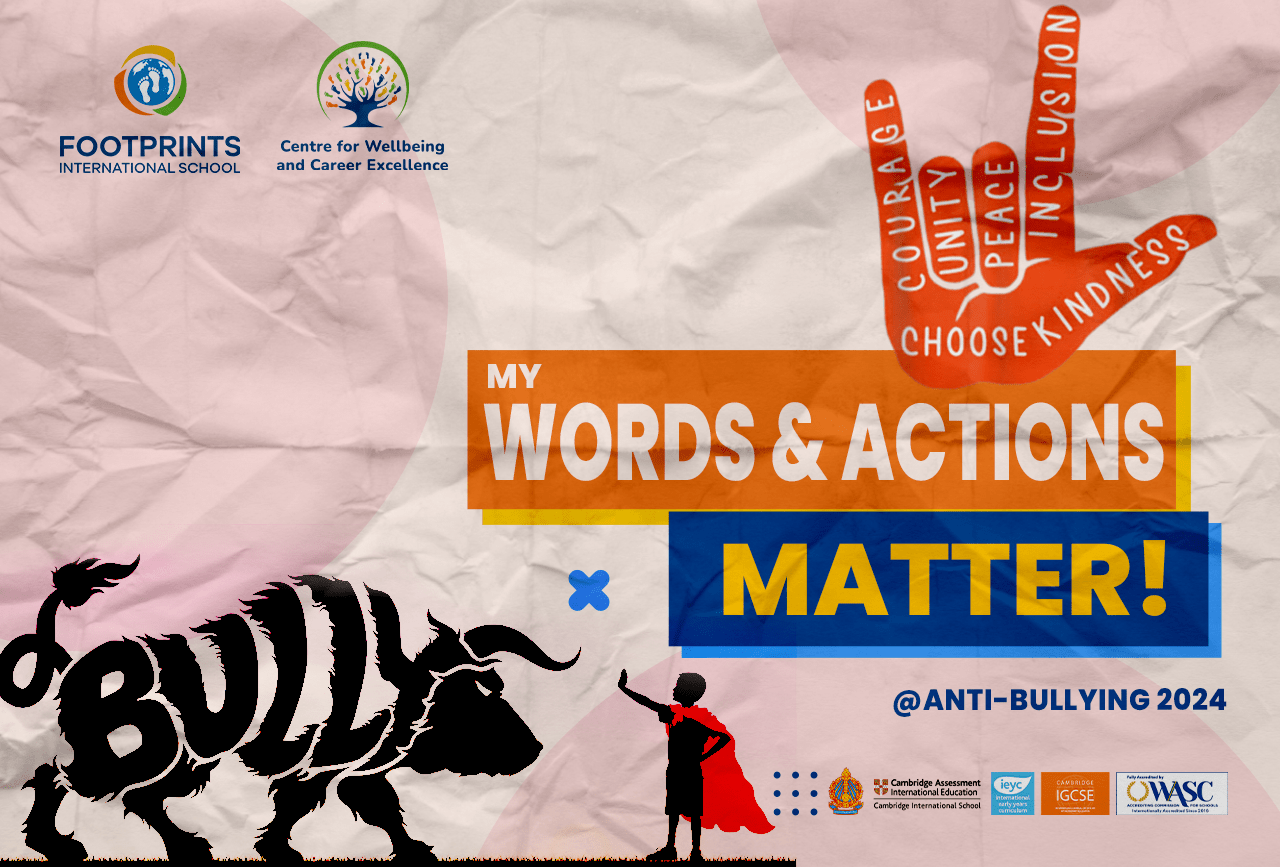
(English) As part of our ongoing commitment to creating a safe and nurturing environment for all our students, Footprints International School and the Centre for Wellbeing and Career Excellence is proud to participate in Anti-Bullying Week 2024, themed “Choose Respect.” This global campaign, which our school will celebrate from September 2nd to Friday, September 6th, 2024, encourages everyone—students, parents, and educators alike—to focus on respect in all interactions to help combat bullying. This is a crucial topic, and understanding it better can empower our community to take meaningful steps to prevent and stop bullying.
Bullying is a repetitive and intentional behaviour where one person exerts power over another, causing harm, fear, or distress. It can take many forms, including physical, verbal, social, and cyberbullying. The impacts of bullying can be devastating, leading to long-term emotional and psychological issues for those involved, whether they are the target, the bully, or even a bystander.
According to UNICEF, bullying is not just a childhood issue but a societal one, with deep-rooted effects that can follow individuals into adulthood. The American Psychological Association (APA) emphasises the importance of addressing bullying early, noting that the emotional scars can last a lifetime.
Raising awareness about bullying is crucial in preventing and addressing it. When students, parents, and educators understand what bullying is and recognise the signs, they are better equipped to take action. Awareness also helps to create a culture of empathy and respect, where bullying behaviours are less likely to thrive.
During Anti-Bullying Week at Footprints International School, we will engage our students in activities and discussions that highlight the importance of kindness and inclusion. By fostering an environment where students feel valued and supported, we can reduce the likelihood of bullying occurring. At the heart of our efforts, we remind everyone that “My Words and Actions Matter“, underscoring the powerful impact each person can have in creating a positive school culture.
Raising awareness about bullying is not just about recognizing the problem—it’s about taking concrete steps to address it. At Footprints International School, we believe that every student has the right to feel safe and respected. By working together and remembering that “My Words and Actions Matter,” we can create a culture of kindness and respect that makes our school a welcoming place for all.
We hope you join us in this important effort during Anti-Bullying Week 2024. Together, let’s “Choose Respect” and make a difference in the lives of our students.
